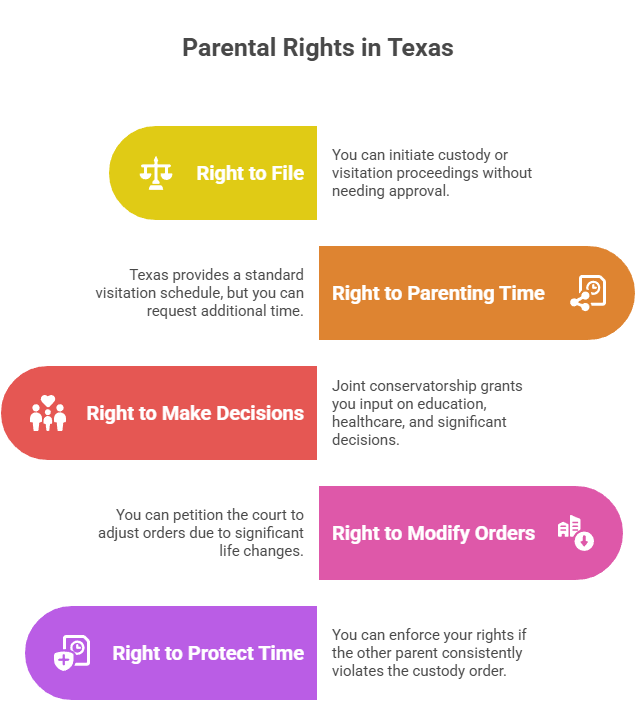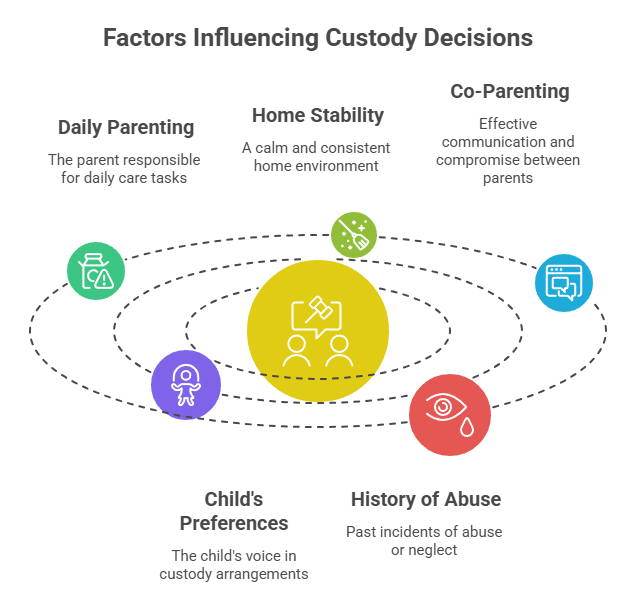How San Antonio Courts View Fathers’ Custody Rights
Let’s be real – too many dads walk into custody court thinking they’ve already lost. They’ve heard the horror stories. They assume the judge is going to hand everything over to the mom, and they’ll be lucky to see their kids every other weekend.
That’s not how it works in Texas. Not anymore.
Here’s the truth: the law doesn’t favor moms or dads. It favors what’s best for the child. And guess what? Dads matter. Your voice matters. Your relationship with your kids matters. But you’ve got to show up, speak up, and have your case together.
If you’re a father fighting for custody in San Antonio, you need to know your rights, understand how local courts think, and stop buying into the myths. This isn’t about “winning” against your ex – it’s about protecting your time, your role, and your connection with your kids.
Bexar County Custody Cases & Dads
First things first – Texas doesn’t even use the word “custody” in legal paperwork. The official term is conservatorship. Sounds fancy, but it just means who makes the decisions and where the child lives.
There are two main flavors:
- Joint Managing Conservatorship (JMC): This is what most judges aim for. Both parents share legal rights and responsibilities. Doesn’t always mean 50/50 time, but both parents stay involved.
- Sole Managing Conservatorship (SMC): One parent takes the lead. They make major decisions like school, healthcare, etc., while the other usually gets visitation (unless there’s a reason to restrict it).
Now here’s where a lot of dads mess up – they assume “joint” means they’ll automatically get equal time. Not necessarily. The court looks at stability, consistency, and who’s doing the work. If you’re showing up late, missing pickups, or winging it – don’t expect 50/50.
Key things San Antonio courts care about:
- Your ability to co-parent like a grown-up
- Your actual involvement – not just what you say you do
- The kid’s needs, not your ego
Bottom line: Texas law gives dads a fair shot, but you’ve got to prove you’re in this for the right reasons – and that your home is a safe, stable place for your child to thrive.
Common Myths About Fathers’ Custody Rights
Let’s shut down some garbage thinking right now. Too many dads come into my office already defeated because they’ve heard the same tired lies from their buddies, coworkers, or that one cousin who got steamrolled in court.
Here’s what’s floating around out there – and what’s actually true:
Myth #1: The courts always side with the mother.
Nope. That might’ve been true 30 years ago, but today? Not how it works. Judges can’t legally make decisions based on gender. If she’s more involved, more stable, or better prepared – that’s why she might get more time, not because she’s the mom.
Myth #2: You’ve got to prove she’s unfit to get more time.
Wrong again. This isn’t a smear campaign. You don’t have to tear her down to build yourself up. Show the court what you’re doing right – your home, your involvement, your parenting chops.
Myth #3: Dads don’t get full custody.
They do. I’ve helped dads win primary conservatorship – because they earned it. It’s not common, but if you’re the stable one, and she’s checked out, it’s absolutely on the table.
Myth #4: Standard visitation is all you’ll ever get.
Only if you don’t ask for more. Courts default to the Standard Possession Order (that every-other-weekend stuff) if there’s no agreement. But if you want more time – and you can handle it – you need to show up and push for it.
Don’t let myths make you passive. Dads who stay quiet or assume they’re out of luck usually get exactly that – less time and less say. That’s on them, not the court.
Key Legal Rights Fathers Have in Custody Cases
Here’s the part most dads don’t hear until it’s too late: you have just as many rights as the mother – if you actually use them. Sitting back and hoping for the best? That’s not a strategy. That’s a shortcut to disappointment.

Here’s what the law gives you in Texas:
- The right to file for custody or visitation.
Whether you’re divorcing, never married, or trying to fix a lousy order – you’re allowed to take action. No permission needed. - The right to parenting time.
Texas has a Standard Possession Order (SPO) that lays out the basic schedule – first, third, and fifth weekends, plus Thursdays. But you can ask for more. And if both of you live close, you might qualify for expanded or 50/50 schedules. - The right to make decisions.
In a joint conservatorship, you get a say in school, medical care, and big life choices. You’re not just a weekend dad unless you choose to be – or unless your track record forces the court’s hand. - The right to challenge or modify orders.
Life changes. Schedules shift. Kids grow up. You’re allowed to go back to court and ask for a new setup if there’s been a legit change in circumstances. - The right to protect your time.
If she’s constantly violating the order – denying visits, making you jump through hoops – you can enforce your rights. Don’t just complain. Document it and take action.
Here’s what this really means: The law doesn’t hand anything to either parent. It’s up to you to push for what’s fair and show that your kid is better off with you fully in the picture.
How San Antonio Family Courts Make Custody Decisions
Think the judge is going to listen to your side, nod, and hand you more time with your kid just because you asked nicely? Think again.
Family court in San Antonio – and all of Texas – follows one rule: What’s best for the child. That’s it. Not what’s cheapest, not what’s easiest, and definitely not what feels “fair” to you.
So, what actually moves the needle?

Here’s what judges look at:
- Who’s doing the parenting day-to-day. If you’re the one packing lunches, helping with homework, and taking them to the doctor – say so. Better yet, prove it.
- Stability at home. Clean house. Steady income. Safe environment. Judges want kids in homes that are calm and consistent – not chaotic or unpredictable.
- How well you co-parent. If you’re the one texting threats, blowing up in public, or refusing to compromise, you’re hurting your case. Judges don’t reward drama.
- The child’s needs and preferences. Older kids (12+) can voice who they’d rather live with. That doesn’t mean they choose, but the judge can take it into account.
- Any history of abuse, neglect, or alienation. If there’s a pattern of one parent blocking the other, ignoring the child’s needs, or worse – that’s going to weigh heavily.
San Antonio courts often bring in parenting evaluators or guardians ad litem to dig deeper into what’s really going on at home. Your social media, texts, emails, even school records can – and will – show up in court.
Want to win? Show up prepared. Don’t just say you’re a good dad – prove it with details, documentation, and witnesses if needed.
Steps Fathers Should Take to Strengthen Their Custody Case
You want more time with your kids? Then show the court you’re not just a father – you’re a full-time parent who’s in it for the long haul.
Here’s how you do that:
1. Document everything.
Pickups. Drop-offs. Bedtimes. School events. Texts. Missed calls. Expenses. If it matters, write it down or screenshot it. Judges love facts – not feelings.
2. Keep your cool, even when your ex doesn’t.
She blows up? Stay calm. She talks trash on Facebook? Don’t take the bait. Courts don’t reward the loudest one – they reward the most stable.
3. Stay involved in the small stuff.
It’s not just about birthdays and ball games. Are you helping with homework? Showing up for dentist appointments? Signing report cards? If you’re not involved in the day-to-day, it’s going to show.
4. Clean up your digital trail.
Yes, the court will absolutely look at your texts, emails, and social media. If there’s anything you wouldn’t want read out loud in front of a judge – delete it and don’t repeat it.
5. Build a parenting routine.
Show that your home isn’t just a crash pad – it’s a real environment for your child. Consistent meals, bedtime, school prep – routine matters.
Quick Checklist:
- Keep a parenting journal
- Save all communication with your ex
- Attend every school and medical appointment you can
- Don’t cancel your visits unless it’s an emergency
- No bad-mouthing the other parent – especially to the kids
This isn’t about proving she’s a mess. It’s about showing the court that you’re solid, steady, and ready to be a hands-on parent. That’s what wins custody cases.
Modifying an Existing Custody Agreement in San Antonio
Already have a custody order but it’s not working anymore? Life changes. Jobs shift. Kids grow. Maybe your ex is slipping, or maybe you’ve stepped up. Either way, you’re allowed to ask the court for a change – but don’t expect them to hand it over just because you’re frustrated.
What qualifies as a legit reason to modify?
- One of you moved
- The child’s needs have changed (school, health, etc.)
- Your ex keeps violating the order
- You’ve taken on more responsibility and the current setup doesn’t reflect that
The court’s not looking for petty drama. You need to show there’s been a material and substantial change in circumstances since the last order. That’s legal-speak for “something big changed that affects the child.”
Steps to modify a custody order:
- File a petition to modify in the same court that issued the original order.
- Back it up with evidence. Think calendars, messages, receipts, and witness statements.
- Be ready for court or mediation. Don’t just expect the other parent to agree. You’ll need to make your case.
And remember – this goes both ways. If she’s the one filing for a change and you’re happy with the current setup, you better show up ready to fight for it.
When to Consult a Family Law Attorney
Some guys try to handle custody cases solo. Maybe to save money, maybe because they think it’s “simple.” Spoiler alert: it’s not. And waiting until you’re drowning to call a lawyer? That’s how you lose time with your kids.
Here’s when you need to stop guessing and get a lawyer involved:
- You’re being denied your court-ordered time
- Your ex is threatening to move with the child
- You’re being falsely accused of anything – abuse, neglect, alienation
- You want to ask for full custody
- There’s a CPS case involved
- You’ve got a complex work schedule that doesn’t fit the standard plan
Family law in San Antonio isn’t something you want to wing. A solid attorney knows the judges, understands the court’s expectations, and can keep you from making emotional decisions that backfire.
Bottom line: If you’re serious about protecting your role as a father, then lawyer up. Your future with your child is too important to risk going it alone.
FAQs about Fathers’ Rights in Custody Cases in San Antonio
Can a father get full custody in Texas?
Yes, but you’ll need more than a good attitude. Full custody (sole managing conservatorship) goes to the parent who can prove it’s in the child’s best interest – especially if the other parent is unstable, uninvolved, or unsafe.
Is Texas a 50/50 custody state?
Texas allows 50/50, but it doesn’t guarantee it. You’ve got to show the court that it works logistically and emotionally for the child. If both parents live nearby and can cooperate, you’ve got a shot.
What age can a child choose which parent to live with?
At 12, a child can voice a preference – but they don’t “choose.” The judge decides, and the child’s opinion is just one piece of the puzzle.
Can I change my custody order if I get a new job?
Maybe. If the job significantly affects your ability to parent (better hours, more stability), that’s a solid reason to ask for a modification. Just be ready to explain how it benefits your child.
What if my ex won’t follow the custody order?
Document every violation – missed exchanges, late drop-offs, denied visits – and take it to court. Judges don’t like repeat offenders, but they need proof to act.
Do I still have to pay child support if I have 50/50?
Maybe. Child support in Texas is based on income and time spent, but 50/50 doesn’t automatically wipe it out. It depends on who earns more and what the parenting agreement says.
How long does a custody case usually take in San Antonio?
Anywhere from a few months to over a year. It depends on whether there’s an agreement, how backed up the court is, and whether experts need to get involved.
Should I talk to my child about the custody case?
Keep it age-appropriate and avoid trash-talking the other parent. Focus on reassuring your child that they’re loved and cared for – court stuff is for adults.
What if my ex moved without telling me?
If your order has a geographic restriction (like staying in Bexar County), she could be in violation. Call your attorney – fast.
Call Brandi Wolfe for Straight-Talking Legal Support
If you’re a father in San Antonio fighting for custody, you don’t need fluff – you need facts, strategy, and someone who knows how to cut through the noise. Brandi Wolfe doesn’t sugarcoat, and she doesn’t back down. She fights for dads who show up, step up, and put their kids first.
Call (210) 571-0400 to schedule a consultation and get serious about protecting your time and rights as a parent.

